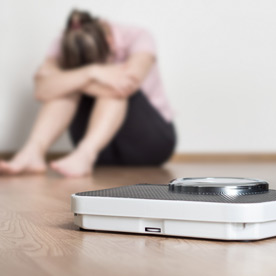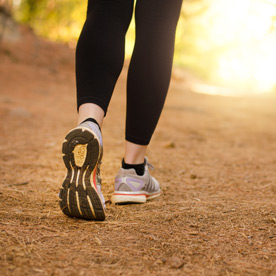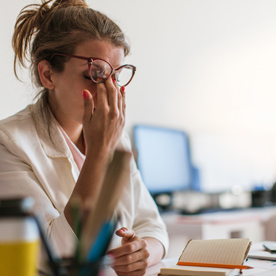
‘Fatigue’ is often conflated with ‘tiredness’. But these are two different things. While tiredness improves with rest, fatigue persists and is a feeling of unrelenting, day-to-day weariness and lethargy.
Everyone experiences fatigue at some point, but women are more susceptible. Often, this is due to hormone differences.But because it's a vague symptom, it can be hard to identify the cause.
Below, we look at the causes of female fatigue and some of the best ways to support energy levels.
Low energy levels in women
There are many possible reasons for low energy in women. Some are linked to a silent culprit – hormones – which play a role in menstruation, menopause, and polycystic ovaries syndrome (PCOS), while others are associated with lifestyle factors like stress.
PCOS fatigue
PCOS is a complex and multi-layered hormonal disorder. It’s characterised by high androgen levels, which can lead to many challenging symptoms, including weight gain, acne, hirsutism, and hair loss.

Many women with PCOS also experience fatigue. The exact reason for this still eludes the scientific community. However, there are several likely contributing factors.
Sleep apnoea
There’s some evidence to suggest women with PCOS are at an increased risk of developing sleep apnoea (1). Sleep apnoea closes your airways and cuts off breathing during the night, rousing you from sleep, fragmenting rest, and leading to daytime fatigue.
Insulin resistance
Around 70 per cent of women with PCOS have insulin resistance (2). When insulin doesn’t work efficiently, it means the sugar in the blood can’t drive into cells to generate energy. This can lead to tiredness and fatigue.
Low iron
Some women with PCOS have heavy periods, which can deplete iron in the body. Since iron is critical for energy production, low levels often result in fatigue.
Mental health challenges
PCOS is also much more than its physical symptoms. The combination of hormonal imbalances and distressing physical effects often creates the perfect storm for mental health challenges, like anxiety and depression.
Navigating PCOS and a mental health condition can lead to poor sleep hygiene and increased fatigue.
Useful tips for PCOS fatigue
-
Consider losing some weight to reduce the risk of sleep apnoea. Losing even 5-10 per cent can support your sleep hygiene, as well as improve many other PCOS symptoms.
-
Try myo-inositol to manage PCOS symptoms and support insulin sensitivity
-
Add a high-strength iron supplement to replace the monthly loss
-
Consider magnesium, 5-HTP, lemon and theanine, and St John’s Wort to support mood
-
Prioritise at least 7-9 hours of sleep every night
You can read more about supporting your health with PCOS on our dedicated health hub.
Period fatigue
The hormonal changes associated with menstruation are also often behind low energy levels in women.
According to a recent study, women on their periods are more likely to experience decreased sleep time, deep sleep, sleep onset latency (how long it takes to fall asleep), and sleep efficiency (total time spent sleeping) (3).
Oestrogen and progesterone fall just before menstruation, making it harder to fall asleep. Specifically, low oestrogen reduces levels of some neurotransmitters, like dopamine and serotonin, which are important in maintaining energy levels and healthy sleeping patterns.
Heavy bleeding can also lead to low iron levels, resulting in fatigue, amongst other symptoms. And if you have a heavy flow, you may have to get up at night to change your sanitary protection or feel anxious about bleeding onto bed linen, both of which can get in the way of achieving adequate rest.
Of course, painful periods cramps and lower back pain can keep or wake you at night, resulting in daytime fatigue.
Useful tips for period fatigue
-
Add a high-strength iron supplement to replace your monthly blood loss
-
Try vitamin B6 to support the regulation of hormonal activity
-
Try mind-body exercises, like yoga or Pilates, to help menstrual discomfort, reduce anxiety, and support sleep
Pregnancy fatigue
The hormonal changes that happen during pregnancy can affect sleep and energy levels. In the first trimester, progesterone increases, which can make you feel lethargic and drowsy.
Pregnancy symptoms, like leg cramps, back pain, heartburn, and night-time bathroom trips can also make it harder to fall and stay asleep, while morning sickness and anxiety about pregnancy can deplete your energy during the day.
Fatigue can persist into postpartum, too. Babies need round-the-clock care, which can leave new mums exhausted.
Useful tips for pregnacy fatigue
-
Add a magnesium supplement to your daily regime to support the reduction of tiredness and fatigue
-
Take a high-quality iron supplement to support oxygen transport and energy production for you and your growing baby
-
Prioritise rest and relaxation every day
-
Try to exercise, even just a little bit
Menopause fatigue
During menopause, women experience fluctuations in the hormones, oestrogen and progesterone, which can directly lead to fatigue.
These hormonal changes can also lead to a range of difficult symptoms, including those which make it harder to fall asleep, such as night sweats.
Menopause can cause mood changes, too. Many women experience increased stress, anxiety, and depression during this transitional phase. Not only can this affect sleep quality and quantity, but it can lead to daytime fatigue, making you less likely to engage in healthy habits that support your energy levels, like exercising.
Useful tips for menopause fatigue
-
Try supplementing with soy isoflavones or sage to keep you comfortable at night
-
Consider magnesium, 5-HTP, lemon and theanine, and St John’s Wort supplements to support emotional health and mood
-
Exercise daily to release ‘feel-good’ endorphins
-
Prioritise at least 7-9 hours of sleep every night
-
Try mind-body practices, like yoga, meditation, or breathwork, to reduce anxiety and support sleep
Read more about menopause fatigue or learn more about supporting your menopause health on our Menopause Hub.
Thyroid issues
The thyroid gland produces hormones that help regulate your metabolism. But when there’s a problem with it, your energy levels can suffer.
Thyroid issues are much more common in women than men and could be the reason for low energy levels in women. Hypothyroidism, or underactive thyroid, can directly lead to fatigue. It can also cause mood changes, like depression, which often affect sleep.
Equally, hyperthyroidism, or overactive thyroid, can make you feel weak, tired, and irritable.
Useful tips
-
Ask your GP to do a blood test to check your thyroid hormone levels
-
Selenium and iodine both support normal thyroid function, so you may wish to increase your intake of these trace minerals
Iron deficiency
An iron deficiency can also lead to fatigue. There are many possible causes of iron deficiency. Heavy periods are a risk factor due to the loss of iron-containing blood. Pregnancy, stomach ulcers, and gastrointestinal diseases, like celiac diseases, can also be to blame for low iron levels in women.
Useful tips
-
Ask your GP to check your iron levels. They should be able to diagnose an iron deficiency with a simple blood test
-
Add a high-strength iron supplement to replenish levels, support energy production, and reduce tiredness and fatigue
-
Increase your intake of iron-rich foods, like lean meats, pulses, dried fruit, and dark leafy greens
Mental health
Unfortunately, mental health issues, like anxiety, depression, and day-to-day stress, go hand in hand with sleep problems and depleted energy levels.
Women are more at risk of experiencing mental health challenges. Studies suggest they’re twice as likely to experience depression, which is characterised by fatigue, as well as feelings of sadness and hopelessness (4).
Societal demands on women to be ‘Human Givers’ may also exacerbate fatigue and sleep loss. Many women are still the ‘household managers’, taking on more domestic and childcare duties, which can lead to exhaustion and burnout.
Useful tips
-
Try adaptogens, like ashwagandha, which help your body deal with stress
-
Increase magnesium and B vitamins to support the nervous system and psychological functions, as well as energy production
-
Consider other supplements often recommended to support emotional health, such as 5-HTP, St John’s Wort, and theanine.
-
Try to move your body every day to release ‘feel-good’ endorphins
-
Prioritise at least 7-9 hours of sleep every night
-
Chat with a professional about your mental health
Chronic fatigue
Chronic fatigue is a complex, long-term health condition that affects more women than men in an approximate ratio of 4:1 (5).
Chronic fatigue causes extreme tiredness that doesn’t improve with rest. And symptoms often worsen with physical or mental activity.
Scientists are still unsure what triggers chronic fatigue. Some experts report symptoms develop after an infection, such as COVID-19 or Epstein-Barr virus; others believe a combination of factors is behind it (6).
Useful tips
-
Try a high-strength vitamin B12 supplement to support energy production
-
Avoid stress and stressful situations where possible
-
Exercise regularly but start slowly and build up
-
Consider CBT therapy
Diabetes
Both type 1 and type 2 diabetes are also associated with increased fatigue. And there are many reasons for this, including poor nutrition, lack of physical activity, skipping meals, and medication side effects.
Aside from this, diabetes can cause depression, which can lead to sleep issues, lethargy, and fatigue.
Useful tips
-
Consider magnesium, 5-HTP, and lemon and theanine to support mood
-
Eliminate processed foods and sugar from your diet
-
Prioritise at least 7-9 hours of sleep every night
-
Try to exercise regularly
Dehydration
Even mild dehydration can cause notable dips in your energy levels, so make sure you drink enough water each day – around 6-8 large glasses, and more when it’s hot.
Useful tips
-
Add fruits, cucumber slices, or berries for flavour
-
Try keeping a reusable bottle with you wherever you go
-
Start the day with a big glass of water
-
Eat foods with plenty of water, like cucumber and celery
Poor nutrition
Research has linked some nutritional deficiencies, such as iron, vitamin C, magnesium, and B vitamins, with increased feelings of fatigue (8).
Useful tips
-
Eat a healthy, balanced, diverse, and whole-food diet
-
Build your meals around plant foods, including fruits, vegetables, whole grains, pulses, beans, nuts, seeds, herbs, and spices
-
If you’re particularly worried about your intake of iron, vitamin C, magnesium, and B vitamins, you may wish to supplement
Natural support for female fatigue
Navigating fatigue as a woman can be exhausting in every sense. Fortunately, there are many ways that can help you to refill the tank when you need it the most.
Improve sleep hygiene
Supporting your sleep hygiene is the first place to start if you want to improve your energy levels. With quality sleep, everything will feel easier.
Be careful with caffeine
It’s not uncommon to reach for caffeine when energy levels are low. And while caffeine can be helpful in moderation – some experts have even called it a ‘health drink’ because of its antioxidant properties – it can disrupt sleep.
Caffeine has a half-life of 5 to 7 hours. So, if you have a coffee at 4 pm, you’ll have only metabolised half of its caffeine by 9 pm – the other half will still be in your system, which can interfere with sleep and continue the cycle of more coffee-drinking and more fatigue.
If you can’t go without caffeine, try to enjoy it before noon. Herbal teas and caffeine-free coffee alternatives are great options if you’re looking to cut back.
Make your bedroom a sleep sanctuary
Optimising your bedroom for rest is a vital part of good sleep hygiene. Make sure it’s quiet, temperate (between 16 and 18 degrees), and dark.
Darkness is particularly important as it triggers the production of melatonin, the sleep hormone, making it essential for quality rest. Consider sleeping with a cosy eye mask if any light creeps into your bedroom.
Enjoy a short nap
Microsleeps can serve as a little boost for your energy levels, with new research suggesting a short daily nap may help cognitive function, brain health, and energy levels (7).
If you do decide to nap, aim for 20-30 minutes and avoid napping too close to bedtime. Think traditional siesta hours (2-5 pm).
Try sleep-supporting supplements
Valerian root, 5-HTP, magnesium, and tart cherry juice are often recommended to support sleep, so you may wish to incorporate them into your daily routine.
Move more
Movement releases ‘feel-good’ hormones called endorphins, which improve mental health and make you less fatigued. Plus, working out helps you sleep better.
Aim for 150 minutes of moderate-intensity activity every week, including cardio-based and strength-based exercises. If you struggle to maintain a routine, set small goals for daily consistency rather than striving for a ‘textbook’ workout.
For instance, it’s better to walk every day for 15-20 minutes, than schedule an intense 3-hour training session at the weekend.
Balance blood sugar
Balancing your blood sugar is one of the best ways to fight fatigue. If there are significant fluctuations in your blood sugar levels, you’ll feel tired, weak, and irritable.
Simply adding more of the ‘right’ carbohydrates to your diet will support healthy blood sugar management. Unlike simple carbohydrates, which are broken down quickly and cause blood sugar to spike almost immediately, complex carbohydrates are digested more slowly, meaning blood sugar levels rise gradually.
For this reason, complex carbohydrates, like quinoa, buckwheat, whole-wheat pasta, sweet potatoes, and brown rice are much healthier choices than processed ‘beige’ foods, like white pasta, breakfast cereals, and sweets.
Alongside eating more complex carbohydrates, try to reduce your intake of sugary foods; they cause an immediate spike in your blood sugar levels and leave you more fatigued.
Other important nutrients for low energy and fatigue in women
Cinnamon
Used in traditional medicine for over 4,000 years, cinnamon is believed to help balance energy reserves in between meals.
Siberian Ginseng
A well-researched adaptogen, Siberian Ginseng helps the body adjust to physical and emotional challenges. It’s a popular choice if you want that ‘get up and go’ feeling without the addition of caffeine.
Rhodiola Rosea
Rhodiola Rosea is often recommended for overall well-being and energy support.
Find out more
There are many reasons behind female fatigue. Some are hormonal, some are medical, and some are lifestyle-related. If you’re struggling with fatigue, there are plenty of ways to help you feel more energised. Of course, if you need further support or you are worried about your health, always chat with your healthcare provider.
If you found this look into low energy levels in women useful, you can find similar guidance on our dedicated health blog. Alternatively, please get in touch with our team of expert Nutrition Advisors, who are on hand to provide free, confidential advice.
References:
-
Ehrmann DA.. Metabolic dysfunction in PCOS: Relationship to obstructive sleep apnea. Steroids. 77(4), 290–294.
-
Marshall JC, Dunaif A.. Should all women with PCOS be treated for insulin resistance? Fertil Steril. 97(1):18-22.
-
Koikawa N, et al.. Changes in the objective measures of sleep between the initial nights of menses and the nights during the midfollicular phase of the menstrual cycle in collegiate female athletes. Journal of Clinical Sleep Medicine. 16(10):1745–1751.
-
Kuehner C. Why is depression more common among women than among men? The Lancet Psychiatry. 4(2):146–158.
-
ME Research UK (2015) ME/CFS in women and men. Available online: https://www.meresearch.org.uk/sex-differences-in-mecfs/
-
Poenaru S. Covid-19 and post-infectious myalgic encephalomyelitis/chronic fatigue syndrome: A narrative review. Therapeutic Advances in Infectious Disease. 8:204993612110093.
-
Paz V, Dashti HS, Garfield V. Is there an association between daytime napping, cognitive function, and brain volume? A Mendelian randomization study in the UK Biobank. Sleep Health [Preprint].
-
Tardy AL, Pouteau E, Marquez D, Yilmaz C, Scholey A. Vitamins and Minerals for Energy, Fatigue and Cognition: A Narrative Review of the Biochemical and Clinical Evidence. Nutrients. 2020 Jan;(1):228. Available online: https://www.ncbi.nlm.nih.gov/pmc/articles/PMC7019735/
Related Posts?
Disclaimer: The information presented by Nature's Best is for informational purposes only. It is based on scientific studies (human, animal, or in vitro), clinical experience, or traditional usage as cited in each article. The results reported may not necessarily occur in all individuals. Self-treatment is not recommended for life-threatening conditions that require medical treatment under a doctor's care. For many of the conditions discussed, treatment with prescription or over the counter medication is also available. Consult your doctor, practitioner, and/or pharmacist for any health problem and before using any supplements or before making any changes in prescribed medications.

Olivia
Olivia Salter has always been an avid health nut. After graduating from the University of Bristol, she began working for a nutritional consultancy where she discovered her passion for all things wellness-related. There, she executed much of the company’s content marketing strategy and found her niche in health writing, publishing articles in Women’s Health, Mind Body Green, Thrive and Psychologies.
View More



